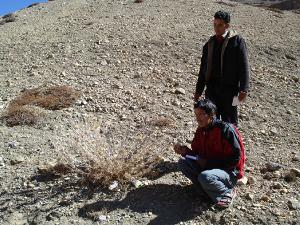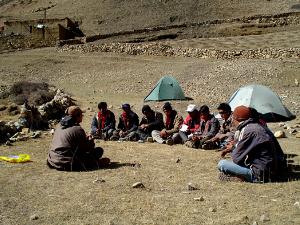Pranav Trivedi
Other projects
7 Sep 2010
Children for Snow Leopards – Strengthening Conservation Education and Awareness in Rural Himalayan Schools to Aid Community-Based Wildlife Conservation
Initiate a conservation education programme by establishing Nature Clubs in rural schools, developing locally relevant resource material/modules for conservation education, training local youth and teachers, and establishing Youth Awareness Clubs in villages.

Through long-term research on human-wildlife relationships and community-based conservation programmes in the Trans-Himalayan region of Spiti, we have been able to foster greater tolerance among people towards the snow leopard, and a curtailment of its persecution that used to occur earlier in response to livestock predation. To strengthen and sustain these efforts and goodwill into future, we have developed a strategy that has identified priority target groups and relevant tools for conservation education. Besides, through a rapid assessment of conservation education needs and ongoing initiatives in Ladakh and Spiti, we found that the existing initiatives are scattered and inadequate (Trivedi et al., in preparation). Systematic and sustained conservation education can bring about a direct improvement in conservation status of snow leopard, associated species and their habitats, besides reinforcing a conservation ethic in the children and youth. Hence, in the proposed project, we aim to generate widespread awareness of conservation issues among local stakeholders, and empower them to strengthen conservation in the Spiti region.

Rural children aged 10-13 years - the future custodians of Himalayan wildlife and village youth, a dynamic group with high potential to bring about change, form the main target groups of this project. The two long-term initiatives of the project would involve establishing 20 Nature clubs (NC) and 10 Youth Awareness Clubs (YAC) targeting about 1,000 children and 50 youth in the first year. Teacher coordinators will run NC with help of local youth in respective schools. Capacity building workshops will be organised to orient and train them in conducting educational activities. A teacher’s guide illustrated workbook for children, nature education camps, nature trails, slide shows and posters will be the chief NC resources/activities. YAC will help empower rural youth by raising their awareness, promoting capacity building and foster local institution development (synergising with village councils).
NC activities are expected to bring about a change in values, attitudes, feelings, understanding and behaviour of school children towards their environment. Thus, our interventions would not only generate greater awareness for conserving the snow leopard and other high-altitude wildlife; they will help communities enhance their capacities to address conservation issues. This project has the potential to be replicated in other regions of the Indian Himalaya and adapted suitably in other snow leopard range countries.